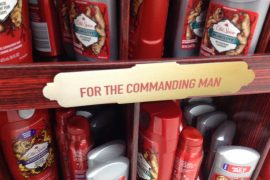Joshua Mohr
A Ziploc bag. That’s it. That’s where she is. A handful of Tracey in there. Ash and shards of bone and maybe a tooth or other specifics that Noah can’t consider. It’s pretty chunky, lumpy. Wait. She’s pretty chunky/lumpy? How do pronouns work with ash?
All he knows is that his sister looks like instant oatmeal. Before you pour the water in. Once its dust slides from the pack. Instant oatmeal. That’s what she is.
A Ziploc bag belligerently given to him by his father. Thrust at him. A joust. A retaliation that means if you can’t protect her alive, try this. Try carting this around your life. Try and forget what you did, Noah.
“I don’t want this,” he had said to his father, their father.
“Your mother wants you to have some of her with you.”
“Why?”
But his father, their father walked away. One day home was enough for Noah, enough for his father—maybe his mother too—maybe having him back around reminded them of the conspicuous absence. Tracey, the talker. Tracey, who always had a monologue going and people went in rooms and exited them and upon returning, chances are she was still gabbing. Suddenly she wasn’t around the house. The three of them, wondering what to do with all this empty air space. For words. To express thoughts or emotions. Though none of them could.
So where should he stow a Ziploc bag of his sister’s ashes? Not all of her cremains, mind you. About a third, according to his father. Noah didn’t like the idea of their dad divvying her up, like a drug dealer, weighing out bags of powder. But more than that he also doesn’t like having that baggie now. On the airplane. Heading back to San Francisco. After the funeral.
He can’t check his sister.
Can’t store her in his backpack.
No, keep her close. Clutch her like . . . like what? Like a vital organ? No. That’s not it. Clutch her like Noah when she first came home from the hospital after being born. A ten year old Noah holding Tracey and rocking her and staring down at her shut eyes and asking his mom, “When will she get hair?”
Noah hating that the question works again. That she has no hair now. No head. No body. She’s instant oatmeal in a Ziploc bag.
He remembers reading an article in Rolling Stone in which Keith Richards confessed to snorting a line of his father’s ashes as a sign of solidarity and togetherness. And it might not be proper etiquette to eat instant oatmeal on a red-eye back to San Francisco still wearing his suit from the funeral and still wearing all the injuries on his face from that forlorn Skype chat and all he has to do is ring the call button to summon the flight attendant and then he can ask for some hot water and then he can mix Tracey’s instant oatmeal in a bowl to get it to a consistency that he can spoon to his lips and choke down and maybe feel a nourishment he’s never known. The nutrients brought on by eating somebody you love. Is it worth a shot? Shit, it’s not the worst idea. He has roughly 33% of his sister and what is he supposed to do with it? Her? Doesn’t want to fetishize it/her around his apartment. Tracey perched in an urn. Casting a pall. Not her style. She was whimsy all the way. She’d want to be outside somewhere. And if he decides to scatter her ashes, where exactly? That’s a lot of pressure. So if he doesn’t want to keep them and wouldn’t know where to release these remains, why not take a page out of Keith Richards’ book and merge with her? Why not lap up her oatmeal at 35,000 feet while everyone else sleeps?
His finger on the call button.
Maybe forty seconds later, a look on the flight attendant’s face like she had been dozing: “Do you need something, sir?”
“Do you have hot water?”
“Yes.”
“Can I have some for my oatmeal?” He shakes the Ziploc bag.
She doesn’t even look at it. “I’ll be right back.”
Maybe another forty seconds and she’s here with a cup of hot water and he lowers his tray table, thankful that he’s the only one in this row and she hands him a spoon and he says, “Thanks,” and she says, “Anything else?” and he wonders whether or not he should ask for some alcohol, something to make this a celebration of sorts, a kind of midair wake, so he says, “Whiskey?” and she says, “Straight?” and he says, “Sure,” and she sighs and says, “I’ll be right back again,” emphasizing the last word as if Noah is wasting her time and normally he’d apologize to her, tell her to forget it, he’s sorry for inconveniencing her, but this is a wake in the sky and it requires a glass of whiskey, miss. While she’s busy sighing and no doubt judging him for being the kind of asshole who orders things one at a time, Noah looks into his plastic cup of water. It’s steaming. It’s about half full. Half empty? Doesn’t matter. Noah estimates that if in fact his father gave him 33% of his sister, he can fit approximately 11% of her in this cup, mixing it with the water to a sort of paste that may or may not look like oatmeal once it’s reconstituted, but enough viscosity so he can swallow some of her. Things change states. For instance, Tracey; she used to be alive. Now she’s dried oatmeal. Soon she’ll go from dust to mud. Soon she’ll go from cup to spoon to mouth. Soon she’ll be a part of him.
If he eats 11% of his original 33%, he’ll be left with 22%.
He’ll have 2/3 of his 1/3.
Math even works with his sister’s ashes.
There’s the steaming plastic cup of hot water and there’s a Ziploc bag of instant oatmeal and there’s a beaten up older brother with a spoon and a suit and a broken heart, and here comes a flight attendant with a tiny bottle of whiskey and Noah pays her for it and she sets it on his tray table with yet another plastic cup—this one totally empty—and he pours the whiskey in the cup and tucks the empty bottle in the pouch on the back of the seat in front of him and this is exactly what a wake in the sky should be. A brother alone with his sorrow and his sister. A brother reeling from a funeral that was a fist. A funeral that had tear ducts. Grief worn like a wet suit, tight to the body. A funeral held in a lung, clammy and loud with mourners plucking clumsy ballads on heartstrings and razor wire. A funeral where people picked at empathy like buzzards with low blood-sugars. One with a body temperature lower than 32 degrees Fahrenheit so tears froze to faces. One where everyone was numb and drunk, alive and dead, and now on this plane at 35,000 feet Noah opens the Ziploc bag and pushes his hands in her ashes and it’s unbearable. The texture of her. The chalkiness. If she is in fact oatmeal, there seems to be dried fruit or something in there but he knows it’s not fruit or nuts or whatever people fancy in their oatmeal these days. No, this is Tracey. She is the chunks. Bullets of bone. This would be so much easier if it was a fine powder. Granular, like refined sugar. Something nondescript. Something anonymous. But these chunks are almost like fingerprints to Noah. Tracey telling him to get his shit together. You’re going to eat me? Well, Keith Richards snorted a line of his dad and . . . Wait, you’re taking advice from Keith fucking Richards? Well, not advice exactly, but I wanted to . . . if Keith Richards is your spirit guide on this, whatever this is, it might be time to pump the brakes.
But there aren’t any brakes. There is only her baggy. There is only Tracey.
Noah grabbing a handful, roughly 11% of his sister and sifting her into the hot water, mixing her around with a spoon, slopping noises while the water works into them, into her. The noise reminding Noah of a cement truck, that wet sound it makes slowly turning its load over and over and over, and there’s a spoon housing a bite and there’s an open mouth blowing the steam that wisps from the oatmeal—the oatmeal that might salve his insides, rub those internal scars in vitamin E so there’s the remote chance of healing.
Still blowing on the bite. The bite of them. The bite of her.
Blowing on the bite of Tracey one last time before opening his mouth and she’s hot on his tongue and this tastes nothing like instant oatmeal. He shoves another bite in his mouth and another and letting her ashes worm down his throat isn’t making him feel better. He’d hoped it would be instantaneous, like anesthesia—count backward from ten, but you barely make it to eight before you’re unconscious. Not for Noah. No, he’s plenty conscious. Alert and distraught with his sister in his mouth, his esophagus, his stomach.
Noah using the spoon to get the dregs of her from the bottom.
He feels full. Noah setting the empty cup down and seeing no choice but to examine his hand. The one that he used to get some of her from the baggy. Scrutinizing the film of ash all over him.
That’s her too.
And he ends up using some of the whiskey to clean his hand, pours it in his palm, washing her away, rubbing his hands together meticulously like a surgeon.
Joshua Mohr is the author of four novels, including Damascus, which the New York Times called “beat-poet cool.” He’s also written Fight Song and Some Things That Meant the World to Me, one of O, The Oprah Magazine’s Top 10 reads of 2009 and a San Francisco Chronicle best seller; Termite Parade was an Editors’ Choice on the New York Times Best Seller list. He lives in San Francisco and teaches in the MFA program at USF. “Wake in the Sky” is an excerpt from his soon-to-be-completed new novel, All This Life.


